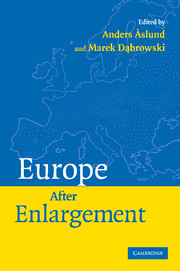Book contents
- Frontmatter
- Contents
- List of Charts, Tables, and Boxes
- Contributors
- Acknowledgments
- Introduction
- 1 Has Europe Lost Its Heart?
- 2 Economic Implications of the Social Provisions of the Stalled EU Constitution
- 3 Fiscal Policy and Fiscal Rules in the European Union
- 4 Design and Implementation of the Stability and Growth Pact: The Perspective of New Member States
- 5 Perspectives on the Lisbon Strategy: How to Increase European Competitiveness
- 6 Is Europe Reforming? Evidence from Cross-Country Structural Indicators
- 7 Recovery Growth as a Stage of Post-Socialist Transition
- 8 Comparative Oligarchy: Russia, Ukraine, and the United States
- 9 The Economic Rationale of the “European Neighbourhood Policy”
- 10 Economic Integration of Eurasia: Opportunities and Challenges of Global Significance
- Index
- References
5 - Perspectives on the Lisbon Strategy: How to Increase European Competitiveness
Published online by Cambridge University Press: 04 December 2009
- Frontmatter
- Contents
- List of Charts, Tables, and Boxes
- Contributors
- Acknowledgments
- Introduction
- 1 Has Europe Lost Its Heart?
- 2 Economic Implications of the Social Provisions of the Stalled EU Constitution
- 3 Fiscal Policy and Fiscal Rules in the European Union
- 4 Design and Implementation of the Stability and Growth Pact: The Perspective of New Member States
- 5 Perspectives on the Lisbon Strategy: How to Increase European Competitiveness
- 6 Is Europe Reforming? Evidence from Cross-Country Structural Indicators
- 7 Recovery Growth as a Stage of Post-Socialist Transition
- 8 Comparative Oligarchy: Russia, Ukraine, and the United States
- 9 The Economic Rationale of the “European Neighbourhood Policy”
- 10 Economic Integration of Eurasia: Opportunities and Challenges of Global Significance
- Index
- References
Summary
Introduction
This contribution focuses on the plight of (most of) the old member states, as the new member states are unlikely to face the same problems. The latter are growing faster than the old EU-15. They are likely to continue to benefit from their low production costs, a production base with a relatively well-educated work force, an improving policy framework, and their proximity to the biggest market in the world.
By contrast, the main theme of the Euroland economy continues to be weakness of both demand and supply. And it is not only the economy that is weak, but also the economic policy making. Fiscal policy plans go awry all the time; the Lisbon Agenda is constantly invoked but no action is taken; and so on. This disarray results from the assumptions underlying existing policies: they are geared for a growing economy in which every year growth allows for some redistribution. Growth prospects are now rather dim throughout most of Euroland due to lower productivity growth and, particularly in Germany, due to demographic developments. Economic policy making is squeezed from both sides.
The low growth diminishes the potential for redistribution, which has an impact on both fiscal and monetary policy. Fiscal policy is deteriorating as finance ministers try to save, and then discover every year that despite their attempts at cutting expenditures, the ratio of public expenditure to GDP does not go down. Year after year, deficits are higher than expected.
- Type
- Chapter
- Information
- Europe after Enlargement , pp. 85 - 105Publisher: Cambridge University PressPrint publication year: 2007
References
- 1
- Cited by

